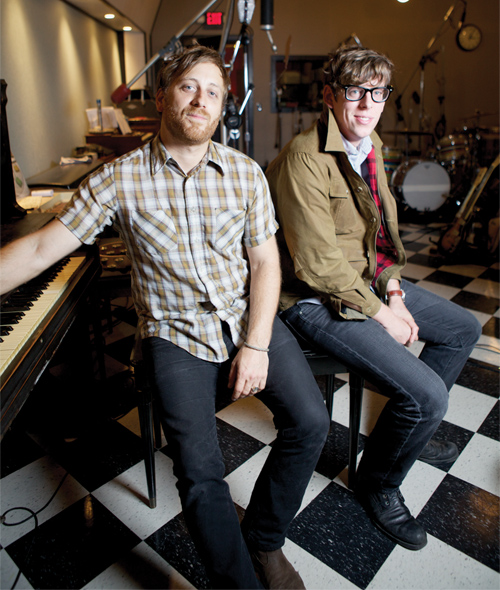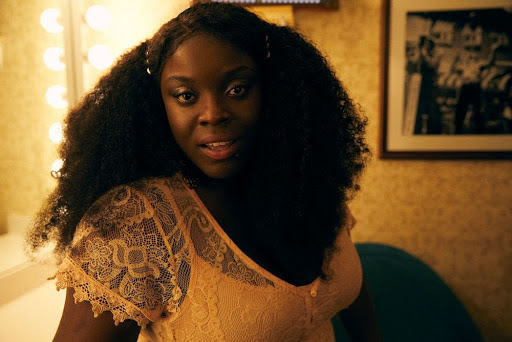Videos by American Songwriter
*****
The studio looks fairly nondescript on the outside, tucked between two storefronts and lined with mean-looking razor wire. The interior is a different story. Opened shortly after Auerbach’s move to Nashville in mid-2010, the place is a gearhead’s paradise, stocked to the ceiling with electric guitars, vintage keyboards and drums in various states of assembly. On the bathroom wall, next to a framed portrait of Bill Monroe playing mandolin in a chicken pen, is an autographed photo of Devo that reads, “To Dan – Whip it good!”
“A big part of Dan’s motivation for moving here was to open that studio, so it was a given that we’d record there,” Patrick Carney tells me a few hours later, sitting outside of the Nashville home he bought several months ago with his fiancée. While he talks, his 100-pound Irish bloodhound puppy, Charlotte, drags an oversized bone across the patio and wags her tail in agreement. She, like her owner, is habitually nice and almost comically tall.
“We started realizing how big Brothers had gotten when we booked Saturday Night Live and got nominated for those Grammys within a two-week period,” he continues. “Then the album went gold one month later. It was cool, but it kinda made me nervous. It was like ‘Uh, f—.’ That’s why we didn’t want to take our usual gap between making records. This past February, we literally went from the Grammy Awards to Las Vegas to play some shows, then home for a week off, and then right into Dan’s studio. We started on March 3. It wasn’t enough time to even consider what was going on.”
Brothers had become the best-selling alternative album of 2010, and The Black Keys found themselves saddled with a new list of expectations from their label, their fans and themselves. They’d gone from Midwest underdogs to Nashville pack leaders in less than twelve months. Recording another album as soon as possible was one method of keeping things under control. This way, they wouldn’t risk falling down the rabbit hole by giving themselves half a year – their typical break between album cycles – to overthink Brothers’ success.
“They’ve been doing this for ten years,” says singer-songwriter Nicole Atkins, who joined the Brothers tour as an opening act last year, “but when things started happening with that album, they happened fast. We went out with them when Brothers first came out, and we were playing big shows to about 2,500 people. Within a matter of months, we’re suddenly playing to crowds between 8,000 and 10,000. It was crazy to see that happen.”
There was a problem, though. In their rush to make a new album that didn’t feel like a response to the last one, The Black Keys hadn’t written any songs. With past recording sessions, the guys had done their homework beforehand, coming into the studio with something – a chord progression, a lyric idea, a drum sound – to get the wheels rolling. This time, they started from scratch every single day, splitting the songwriting duties three ways with co-producer Brian Burton, aka Danger Mouse. Songs would be written in hour-long bursts of inspiration, then reworked several times over the course of a few days. Once everyone settled on an arrangement, things would start moving faster, with most of the tunes being recorded in one or two takes. Still, it took a long time to reach that point.
Their tour schedule got in the way, too. They’d already pulled the plug on some shows in Australia, New Zealand and Europe, but canceling everything was out of the question. Deciding it was possible to have their cake and eat it, too, The Black Keys began shuffling themselves between the studio and the stage, recording new songs one minute and performing old ones the next.
“We were in the studio for 41 days,” says Auerbach, “but it was off and on. We’d go on tour, come home for a week, go out on tour again, come back for another week. It took longer than any record we’ve ever done. And everything – everything – was labored over.”
The hard work paid off. El Camino cherry-picks the best things about previous Black Keys records – the mix of ‘60s soul and swampy electric blues; the raw analog production; the psychedelic smog that floats through the background like wisps of pot smoke – and filters them through a smudged-up rock and roll lens. It’s Brothers on steroids, with denser guitars and faster tempos. Carney says the band looked to The Ramones and rockabilly icon Johnny Burnette for inspiration, which may explain why some of these songs are much quicker than anything else in The Black Keys catalog.
“For the first time,” he explains, “we were getting into the nuances of each song by asking ourselves, ‘How long should this intro be? How long should the pre-chorus be? Should there even be a pre-chorus?’ We were playing with tempos and BPMs, seeing how a vocal hook does or doesn’t work at a faster speed. And usually, we went with the faster option.”













Leave a Reply
Only members can comment. Become a member. Already a member? Log in.